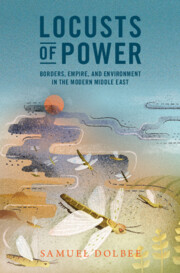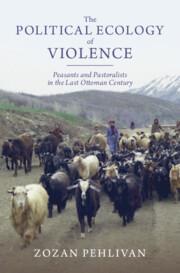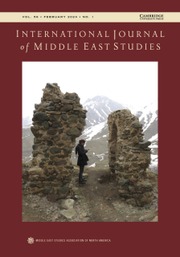Locusts of Power
In this highly original environmental history, Samuel Dolbee sheds new light on borders and state formation by following locusts and revealing how they shaped both the environment and people's imaginations from the late Ottoman Empire to the Second World War. Drawing on a wide range of archival research in multiple languages, Dolbee details environmental, political, and spatial transformations in the region's history by tracing the movements of locusts and their intimate relationship to people in motion, including Arab and Kurdish nomads, Armenian deportees, and Assyrian refugees, as well as states of the region. With locusts and moving people at center stage, surprising continuities and ruptures appear in the Jazira, the borderlands of today's Iraq, Syria, and Turkey. Transcending approaches focused on the collapse of the Ottoman Empire or the creation of nation states, Dolbee provides a new perspective on the modern Middle East grounded in environmental change, state violence, and popular resistance.
Awards
Co-winner, 2024 Ottoman and Turkish Studies Book Prize, Ottoman and Turkish Studies Association
Reviews & endorsements
'It turns out that the locust can speak and Samuel Dolbee tells us how. Grounded firmly in the fertile intersection of Ottoman, post-Ottoman and environmental studies, this book demonstrates how human-pesticide relationships shaped the transformation of Ottoman Jazira: from 'desert' to agricultural land; from a place for the sedenterization of nomads to one for the forced nomadization of sedentary populations for genocidal purposes, and how the same land then became parts of post-Ottoman Turkey, Iraq, and Syria. It will become a classic and deservedly so.' Lerna Ekmekcioglu, Massachusetts Institute of Technology
'In this deeply empirical and eloquent book, Samuel Dolbee offers a history of a part of the Middle East that scholars have missed (or ignored)-the Jazira. Following Dolbee following locusts across this landscape opens up modes of political and environmental analyses that point the way for future studies.' Alan Mikhail, Yale University
'[A] fascinating and compelling book that takes seriously both the neglected space of the Jazira and the locusts as actors.' Jeanine E. Dağyeli, Agricultural History
Product details
May 2023Hardback
9781009200318
336 pages
235 × 158 × 25 mm
0.65kg
Not yet published - available from July 2025
Table of Contents
- Introduction
- 1. Sultans of the open lands (1858–1890)
- 2. 'Savage swarms' (1890–1908)
- 3. 'Weren't we a lot like those creatures?' (1908–1918)
- 4. 'Like swarms of locusts' (1918–1939)
- Conclusion
- Bibliography
- Index.





